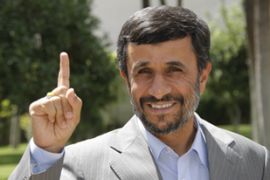Ahmadinejad orders nuclear work
Iranian president tells country’s atomic energy chief to begin enriching uranium.

Later during the day, Salehi said Iran will start producing 20 per cent enriched nuclear fuel from Tuesday.
“We will hand over an official letter to the IAEA (International Atomic Energy Agency) tomorrow, informing the agency that we will start making 20 per cent enriched fuel from Tuesday,”he told Iran’s Arabic-language state television channel, al Alam.
Iranian officials have repeatedly said their country can make fuel enriched to 20 per cent itself if there is no agreement on obtaining the material from abroad.
But in recent days Iran has seemed close to a deal with the West over shipping its nuclear material abroad to be turned into fuel and then returned.
Countering criticism
Alireza Ronaghi, Al Jazeera’s correspondent in Tehran, said the president’s comments were aimed at countering domestic criticisms of his announcement that Iran was ready to accept the deal.
| IN DEPTH | |||||||||
|
“President Ahmadinejad is sending a message to his critics inside the country and within the conservative camp – [to] those who thought he was moving far ahead of the Supreme Leader [Ayatollah Ali Khamenei],” he said,
“This is obviously not going to have a very positive effect [on negotiations with the West] … the world powers that are involved in the nuclear talks are not very happy about Iran always trying to prove its own capabilities when there is a negotiation going on.”
Some Iranian officials have opposed the proposed nuclear deal, saying they would prefer a simultaneous exchange on Iranian soil, a plan rejected by world powers.
Robert Gates, the US defense secretary, said on Sunday that it was time for the international community to rally together to pressure Iran to abandon its nuclear programme and expressed optimism that, given time, tougher sanctions would work.
“If the international community will stand together and bring pressure to bear on the Iranian government, I believe there is still time for sanctions and [diplomatic] pressure to work,” he told reporters during a visit to Italy.
“But we must all work together,” he said.
‘Iran ready’
Mohamed Marandi, a professor in political science at Tehran University, said the Iranian view is that it is the Americans, not Iran, who are thwarting the deal.
“The Iranians are quite ready to exchange their nuclear fuel … but they feel that the Western countries are trying to make a crisis and trying to make things more difficult for Iran,” he told Al Jazeera.
“Just as the Western countries are using carrots and sticks as they call it, the Iranians feel that it’s time for them to show some of their sticks.”
|
“I think Iran keeps missing the global community’s generous messages about how to defuse a crisis.” John Kerry, |
The US and Germany said on Saturday that they saw no sign Tehran would make concessions on its nuclear programme, despite recent upbeat comments from Manouchehr Mottaki, Iran’s foreign minister, over the prospect of a deal.
The West fears Iran is trying to build a nuclear weapon, but Tehran insists its nuclear programme is for purely civilian purposes.
John Kerry, the US senator, who was in Munich attending an international security conference, told Al Jazeera that Ahmadinejad’s comments were “confusing” and “unfortunate”.
“I think Iran keeps missing the global community’s generous messages about how to defuse a crisis,” he said.
“He [Ahmadinejad] seems only to understand confrontation and he’s on a good path to get it the way he’s going. I think it’s very sad, obviously there are lots of pressures within Iran that are at play here, and so I think the western community just needs to proceed down the road steadily, with determination.
“A nuclear Iran in it’s current context is dangerous and unacceptable, that has been the policy of every nation that I know of that has been involved in trying to persuade Iran otherwise.”
